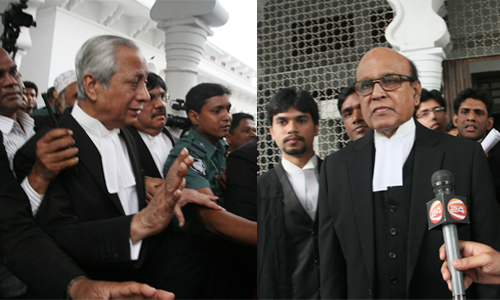
Attorny general Mahbubey Alam (Left), Mir Quasem Ali’s lawyer Khandker Mahbub (Right), coming out from the courtroom after the appellate division upheld death sentence for Mir Quasem Ali.
The Appellate Division on Tuesday upheld the death sentence of Jamaat-e-Islami leader Mir Quasem Ali for crimes against humanity he had committed during the 1971 war for independence.
A five-judge bench chaired by the chief justice, SK Sinha, upheld the death sentence in one of the two charges that were handed down by the trial court earlier.
The bench includes Justice Syed Mahmud Hossain, Justice Hasan Foez Siddique, Justice Mirza Hussain Haider, and Justice Mohammad Bazlur Rahman.
Security was beefed up in and around the apex court.
Earlier on February 24, the appellate division, after hearing both the government and the appellant sides, posted for March 8 the pronouncement of its verdict in the appeal filed by condemned Mir Quasem against his death sentence.
The International Crimes Tribunal-2 had sentenced Mir Quasem Ali, Al-Badr boss in the port city of Chittagong in 1971, to death on November 2, 2014.
He had appealed to the Appellate Division against the tribunal’s verdict on November 30. The Appellate Division started hearing the appeal on February 9, 2016.
Handing down verdict in Mir Quasem’s appeal was delayed by sometimes as court staff mistakenly dropped the appeal from Tuesday’s cause-list. Later, the verdict was delivered preparing a supplementary cause-list.
The Appellate Division upheld death sentence in abducting and torturing six people including juvenile freedom fighter Jasim in confinement from the day of Eid-ul-Fitr in 1971 to November 28, 1971 and later concealing their bodies in river Karnaphuli.
The Appellate Division relieved from the charges of abducting Jahangir Alam Chowdhury, Tuntu Sen and Ranjit Das Latu and torturing them in confinement, looting and setting their houses on fire and later killing Ranjit and Tuntu in November 1971.
On September 5, 2013, he was charged with 14 charges and convicted of 10 charges and acquitted of the rest four charges.
The Appellate Division also acquitted him of more three charges and upheld punishment on seven charges with death sentence for one charge and various terms of jail in other six charges.
After the verdict, attorney general Mahbubey Alam said the continuity of war crimes trial would be hampered if Mir Quasem’s death sentence was not upheld.
He also lamented at the act of some quarters who think that only they were in favour of war crimes trial. ‘It is the incumbent government which initiated war crimes trial out of political decision,’ he said.
About the court’s contempt rule, he said the court was angry with the remarks of two ministers and considered it interference in judiciary.
Mir Quasem’s counsel Khandker Mahbub Hossain said as a lawyer he accepted the court verdict. He said he would consult his client and take decision on filing review petition seeing the full verdict.
The International Crimes Tribunal verdict had said Quasem was the ‘leader’ and de facto Al-Badr Bahini commander at its Dalim Hotel camp in the port city where freedom fighters and pro-liberation people were detained, tortured and slaughtered.
It called Dalim Hotel the ‘death factory’ and ‘criminal enterprise’ of Al-Badr Bahini and Quasem its ‘ring leader’ and ‘boss’.
Quasem has been detained in jail since his arrest on June 17, 2012 at daily Naya Diganta office at Motijheel on war crimes charges.
The activists of Ganajagaran Mancha burst into celebrations after hearing the court verdict. The mancha spokesperson, Imran H Sarker, expressed satisfaction after the apex court upheld the death sentence of Mir Quasem.
He said the court proved again it does not compromise with any criminal as much as powerful he is.
With the verdict, justice has been established ending all conspiracies.
Mir Quasem’s wife Khondaker Ayesha Khatun in a statement said that the evidence brought against her husband was not sufficient and it can no way to probe the offences. It was also understood by the chief justice’s remarks he made during argument of the case, said the statement.
‘Therefore, there is no legal basis to uphold the death sentence,’ it said.
‘Some ministers’ open threaten to the chief justice and changing of the court’s decision frequently just before pronouncement of the verdict, now question arises to us and even among the people of the country if the judiciary is actually independent,’ said the statement.
‘We are deprived of justice, and therefore, we will file review petition after getting copy of the verdict,’ said the statement.
Source: New Age

